
The Estonian Centre Party is a centrist, social-liberal, populist political party in Estonia. It is one of the two largest political parties in Estonia and currently has 26 seats in the Estonian Parliament. The party is a member of the Alliance of Liberals and Democrats for Europe (ALDE).

The Estonian Reform Party is a liberal political party in Estonia. The party is led by Kaja Kallas and has 34 members in the 101-member Riigikogu, making it the largest party in the legislature.
The Social Democratic Party is a social-democratic political party in Estonia, currently led by Indrek Saar.
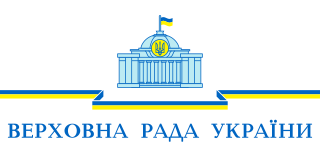
The Verkhovna Rada of Ukraine, often simply Verkhovna Rada or just Rada, is the unicameral parliament of Ukraine. The Verkhovna Rada is composed of 450 deputies, who are presided over by a chairman (speaker). The Verkhovna Rada meets in the Verkhovna Rada building in Ukraine's capital Kiev. The deputies elected in the 21 July 2019 Ukrainian parliamentary election were inaugurated on 29 August 2019.

Toomas Hendrik Ilves is an Estonian politician who served as the fourth President of Estonia from 2006 until 2016. Ilves worked as a diplomat and journalist, and he was the leader of the Social Democratic Party in the 1990s. He served in the government as Minister of Foreign Affairs from 1996 to 1998 and again from 1999 to 2002. Later, he was a Member of the European Parliament from 2004 to 2006. He was elected as President of Estonia by an electoral college on 23 September 2006 and his term as President began on 9 October 2006. He was reelected by Parliament in 2011.
The Pro Patria Union was a national-conservative political party in Estonia. The party was founded on 2 December 1995 from a merger of the Estonian National Independence Party and the Pro Patria National Coalition.
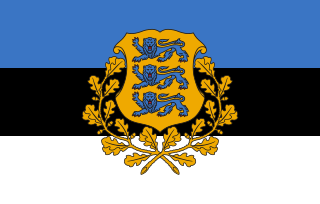
The President of the Republic of Estonia is the head of state of the Republic of Estonia. The current President is Kersti Kaljulaid, elected by Parliament on 3 October 2016, becoming the first woman and youngest person ever who holds the position.
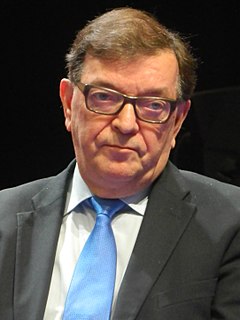
Paavo Matti Väyrynen is a Finnish politician and a member of the Finnish Parliament, representing the Seven Star Movement and formerly the Citizen's Party and Centre Party. Väyrynen has been a member of the Finnish Parliament previously from 1970 to 1995 and again from 2007 to 2011 and has held many ministerial portfolios. He has also been a Member of the European Parliament from 1995 to 2007, and again from 2014 to 2018.

The Democratic Party of Moldova is a centre-left political party in the Republic of Moldova. The party was established in 1997 and it is an associate member of the Party of European Socialists (PES) and is a full member of the Socialist International.

Pierre René Hubert Marie "Rene" van der Linden is a retired Dutch politician and diplomat of the Catholic People's Party (KVP) and later the Christian Democratic Appeal (CDA) party and economist.

Isamaa is a conservative political party in Estonia. It was founded on 4 June 2006 when two conservative parties, Pro Patria Union and Res Publica Party, merged. Up to the 2007 parliamentary elections, the party held 32 seats out of 101 in the Riigikogu and one of Estonia's six seats in the European Parliament. The party is a member of the European People's Party (EPP). It has about 8,500 members. The merged party consisted of two separate boards and two party leaders, which was replaced by a unified board and leader in May 2007. The party's prime minister candidate was Mart Laar, who became a chairman of the party.
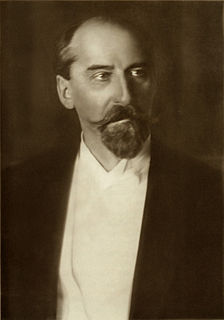
The Estonian Constituent Assembly was elected on 5–7 April 1919, called by the Estonian Provisional Government during the Estonian War of Independence. The Assembly was elected by party-list proportional representation in one nationwide district using the D'Hondt method. Eligible voters included soldiers at the front. The elections were won by left-wing and centrist parties.

Parliamentary elections were held in the Latvian SSR on 18 March 1990. It was the first free parliamentary election in Latvia since 1931 and saw 201 deputies elected to the Supreme Soviet of the Latvian SSR, 170 of them in the first round. Run-off elections were held on 25 March, 1 April and 29 April. The Popular Front of Latvia won over two-thirds of the vote. Unlike its Estonian and Lithuanian counterparts, the Latvian Communist Party did not separate from the Communist Party of the Soviet Union. Nonetheless, on 3 May 1990, the new Supreme Soviet re-elected the Communist Party member Anatolijs Gorbunovs as its chairman, effectively the leader of Latvia. He subsequently resigned from the party, and a year later the Communist Party was banned by the parliament.

The Conservative People's Party of Estonia is a national-conservative and right-wing populist political party in Estonia. It has been described in the mainstream media as belonging to the far-right. Since 2013, its chairman has been Mart Helme, the former Estonian ambassador to Russia. The head of the parliamentary group is Martin Helme. The party's identitarian youth wing, Blue Awakening, organizes frequent nationalist torchlight marches in Estonia. Ideologically, the party is a descendant of the Estonian ethno-nationalist camp. Political commentators often place the EKRE on the right to far-right of the political spectrum, but party representatives reject this and suggest other ways of looking at the left–right axis.
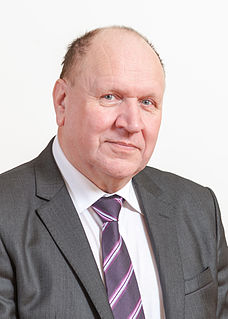
Mart Helme is an Estonian politician, Minister of the Interior since 29 April 2019, and chairman of the national conservative Conservative People's Party of Estonia (EKRE) since 13 April 2013. A historian by profession, he also served as Estonia's ambassador to Russia from 1995 to 1999. His son Martin Helme is the leader of the party's parliamentary group. Some media outlets have described him as politically populist and/or far-right.

Taavi Rõivas is an Estonian politician, former leader of the Reform Party and former Prime Minister of Estonia. Before his term as the Prime Minister, Rõivas was the Minister of Social Affairs from 2012 to 2014. On 9 November 2016 his second cabinet lost a no confidence motion after two parties in the ruling coalition sided with the opposition.

The Estonian Free Party is an Estonian centre-right political party founded in 2014. The chairman of the party is Heiki Lill. The party gained 8 seats after passing the 5-percent threshold in the 2015 Estonian parliamentary elections.
An indirect election took place in Estonia in 2016 to elect the president of Estonia, who is the country's head of state. The Riigikogu — the Parliament of Estonia — elected Kersti Kaljulaid to be the next head of state of Estonia to succeed Toomas Hendrik Ilves, who had served his second and final term as president. Kaljulaid is the first female head of state of Estonia.

Artur Talvik is an Estonian politician, film director, film producer, actor, and screenwriter. He is a member of the Riigikogu and a former member of the Estonian Free Party. He now leads the Richness of Life party.
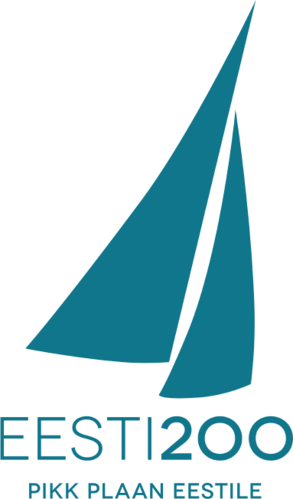
Estonia 200 is a liberal Estonian political party, which was founded on 3 November 2018. The political movement that preceded the party, first published its manifesto in Postimees on 2 May 2018. The authors of the manifesto were Priit Alamäe, Indrek Nuume, Küllike Saar, Kristina Kallas and Kristiina Tõnnisson. In authors' minds, the aim of Estonia 200 is to bring attention to Estonia's long lasting problems and put forward their solutions and reform ideas.



















